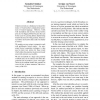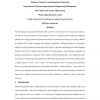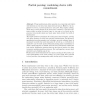699 search results - page 26 / 140 » Natural Language Interface Using Shallow Parsing |
110
click to vote
EMNLP
2010
15 years 13 days ago
2010
Unknown words are a hindrance to the performance of hand-crafted computational grammars of natural language. However, words with incomplete and incorrect lexical entries pose an e...
104
Voted
IWPT
2001
15 years 3 months ago
2001
Natural language processing technologies offer ease-of-use of computers for average users, and easeof-access to on-line information. Natural language, however, is complex, and the...
113
click to vote
GECCO
2003
Springer
15 years 7 months ago
2003
Springer
The process of labeling each word in a sentence with one of its lexical categories (noun, verb, etc) is called tagging and is a key step in parsing and many other language processi...
143
click to vote
ACL
2007
15 years 3 months ago
2007
This paper presents a comparative study of five parameter estimation algorithms on four NLP tasks. Three of the five algorithms are well-known in the computational linguistics com...
119
Voted
IFL
2007
Springer
15 years 8 months ago
2007
Springer
Abstract. Parser combinators, often monadic, are a venerable and widelyused solution to read data from some external format. However, the capability to return a partial parse has, ...



